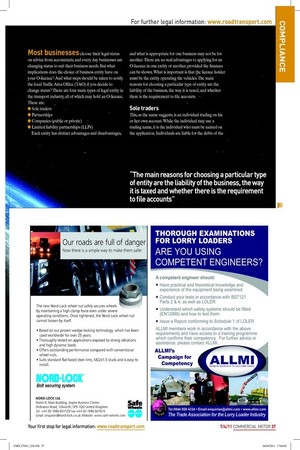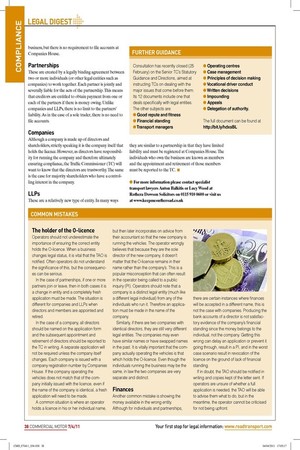“The main reasons for choosing a particular type of entity
Page 26

Page 27

If you've noticed an error in this article please click here to report it so we can fix it.
are the liability of the business, the way it is taxed and whether there is the requirement to file accounts”
Most businesses choose their legal status
on advice from accountants, and every day businesses are changing status to suit their business needs. But what implications does the choice of business entity have on your O-licence? And what steps should be taken to notify the local Trafic Area Ofice (TAO) if you decide to change status? There are four main types of legal entity in the transport industry, all of which may hold an O-licence. These are: ● Sole traders ● Partnerships ● Companies (public or private) ● Limited liability partnerships (LLPs) Each entity has distinct advantages and disadvantages, and what is appropriate for one business may not be for another. There are no real advantages to applying for an O-licence in one entity or another, provided the inances can be shown. What is important is that the licence holder must be the entity operating the vehicles. The main reasons for choosing a particular type of entity are the liability of the business, the way it is taxed, and whether there is the requirement to ile accounts.
Sole traders
This, as the name suggests, is an individual trading on his or her own account. While the individual may use a trading name, it is the individual who must be named on the application. Individuals are liable for the debts of the business, but there is no requirement to ile accounts at Companies House.
Partnerships
These are created by a legally binding agreement between two or more individuals (or other legal entities such as companies) to work together. Each partner is jointly and severally liable for the acts of the partnership. This means that creditors are entitled to obtain payment from one or each of the partners if there is money owing. Unlike companies and LLPs, there is no limit to the partners’ liability. As in the case of a sole trader, there is no need to ile accounts.
Companies
Although a company is made up of directors and shareholders, strictly speaking it is the company itself that holds the licence. However, as directors have responsibility for running the company and therefore ultimately ensuring compliance, the Trafic Commissioner (TC) will want to know that the directors are trustworthy. The same is the case for majority shareholders who have a controlling interest in the company.
LLPs
These are a relatively new type of entity. In many ways they are similar to a partnership in that they have limited liability and must be registered at Companies House. The individuals who own the business are known as members and the appointment and retirement of those members must be reported to the TC. ■ ● For more information please contact specialist transport lawyers Anton Balkitis or Lucy Wood at Rothera Dowson Solicitors on 0115 910 0600 or visit us at www.keepmeontheroad.co.uk

















































